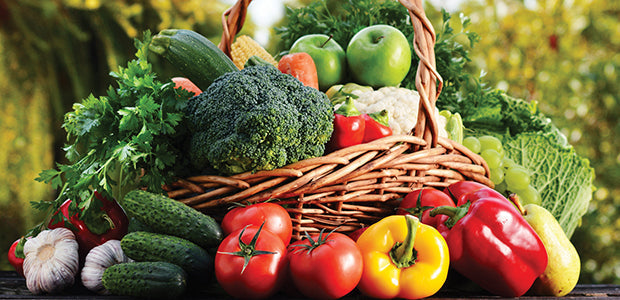Organic farming has long had a bad reputation. However, it has quickly gained in popularity and rigor, following the modern shift in agricultural and food practices.
With this growth, the principles and benefits of organic agriculture are becoming better known and documented. It is becoming clear that organic agriculture has concerted benefits for our health and that of the ecosystems.
Organic Agriculture: What is it?
Organic agriculture is a practice that promotes the protection of the environment and proscribes the use of pesticides, synthetic fertilizers, antibiotics, growth hormones and genetically modified organisms (GMOs). It is a growing market.
In Canada, organic agriculture represents a $4.7 billion market. This includes 56% of Canadian consumers who regularly purchase organic food. To meet this high demand, more than 4000 Canadian producers are involved in organic agriculture. 1
These producers are working hard to maintain industry standards. For a company to be certified, it must rigorously apply the requirements of the industry.
In fact, since 2009, a Canadian standard has been in place that sets out the guidelines for organic agriculture. The Canadian Food Inspection Agency enforces the consistency of this standard for certified producers.
Organic certification of producers is ensured by independent organizations such as Québec Vrai and Ecocert. In Quebec, these independent certification bodies are supervised by the Conseil des appellations réservées et des mentions valorisantes (CARTV).
The organic designation is the most regulated food certification system in Canada. It is a very comprehensive system that provides maximum safety for the consumer. 2
| To summarize: The organic designation is highly controlled in Canada; the certified organic product is truly organic.
Organic Agriculture: Benefits for the consumer
Many consumers choose organically grown foods for health reasons. Many buyers want to reduce their exposure to chemicals by eating organic products.
The health benefits of organic farming have long been debated. Now, an epidemiological study published in October 2018 has shed light on the issue by studying a group of 70,000 people over a 7-year period. Last fall, the American medical journal JAMA published the results of this study concluding that eating organic would reduce the risk of contracting certain cancers, such as breast cancer and blood cancer. 3
This is due to the absence of many synthetic pesticides commonly used in conventional agriculture. These have been found to be carcinogenic, hormone disrupting and harmful to the development of children. 2
By opting for organic products, the consumer also maximizes the nutritional potential of his food since it contains more polyphenols and good fats. 4, 5
|To summarize: Organic farming confers direct health benefits to the consumer by reducing chemical exposure and improving the nutritional potential of foods.
Organic Agriculture: Benefits to the Land and the Ecosystem
Customers who consume organic products also do so out of concern for the environment.
Indeed, organic farming practices have a positive influence on the earth and ecosystems. Organic farming has the direct effect of:
- Environmental protection;
- The maintenance of biodiversity;
- Improving soil fertility and quality;
- Water conservation;
- Animal welfare 2
To meet industry standards, organic farmers must employ techniques that support soil, water and ecosystem health. Crop rotation, nutrient delivery to the soil through composting and green manures, and natural pest control are rigorous industry standards. 1, 2
Rather than using chemical fertilizers and synthetic pesticides that are harmful to insect and soil health, organic farmers focus on prevention by selecting more disease-resistant plant varieties, practicing crop rotation and developing areas that promote biodiversity.
Some have even developed natural remedies against insect infestations. This is the case of Mariane Desjardins Roy, a herbalist farmer who makes her own natural plant-based "pesticides" that she grows on her extensive land. "I wouldn't use [synthetic] pesticides out of respect for the earth, the insects and the micro-organisms that work in the soil. The soil is what feeds our food and nourishes us." Mariane Desjardins Roy, herbalist farmer, founding owner of of the herbalist La Fée des Bois and distributor of baskets of organic medicinal plants. According to Mariane and many farmers, organic practices allow one to develop a close relationship with the land and to learn to work with nature's tools.
|To summarize: Organic farming promotes healthy soil, healthy waterways, healthy biodiversity and healthy insects.
Whether it's to preserve soil, ensure stream quality, save insect populations, prevent cancer or maximize the nutritional potential of your food, there are many reasons to support organic farming practices.
La Boite à Grains is proud to support the region's organic farmers and invites you to meet them at our branches at farm dayson March 23 and 24, 2019.
Good health!
The team of La Boite à Grains
_______________________
Research and writing :
Véronique Cousineau, certified naturopath and health and wellness writer
Sources:
1: Dorais, M. Full professor in Plant Cultivation in Controlled Environments and Organic Horticulture at the Centre for Plant Research and Innovation (CRIV) of L'Université Laval. 2017, Colloque Maraicher bio.
2: Think Organic Canada
3: JAMA Intern Med, NutriNet-Santé, Julia Baudry, PhD 1; Karen E. Assmann, PhD 1; Mathilde Touvier, PhD 1; et al, Association between frequency of organic food consumption and cancer risk, October 2018.
4: Barański, M., Średnicka-Tober, D., Volakakis, N., Seal, C., Sanderson, R., Stewart, G., ... Leifert, C. (2014). Higher antioxidant and lower cadmium concentrations and lower incidence of pesticide residues in organically grown crops: A systematic literature review and meta-analyses. British Journal of Nutrition, 112(5), 794-811.
5: Benbrook CM, Davis DR, Heins BJ, et al. Enhancing the fatty acid profile of milk through forage-based rations, with nutrition modeling of diet outcomes. Food Sci Nutr. 2018;6:681-700.


